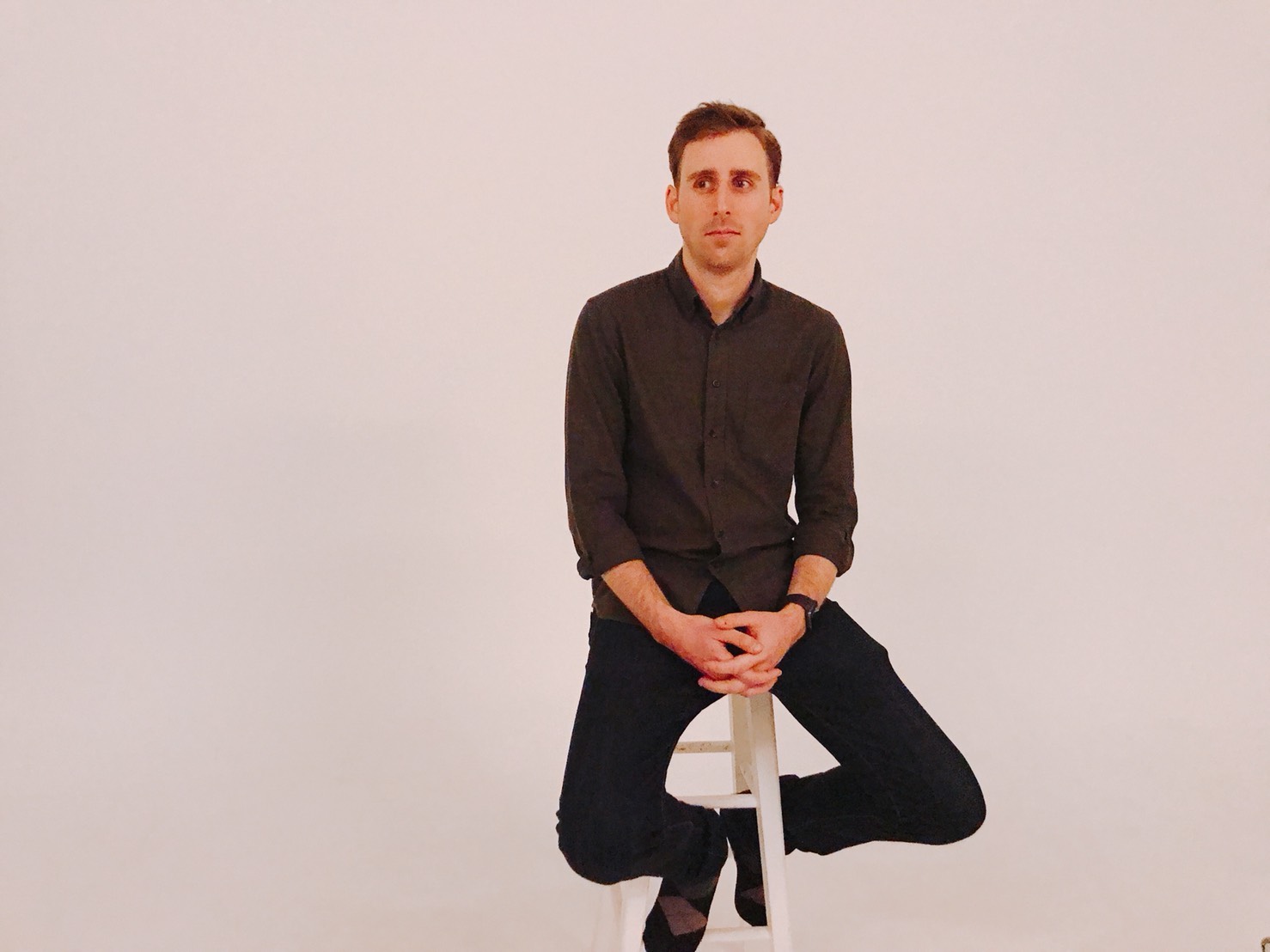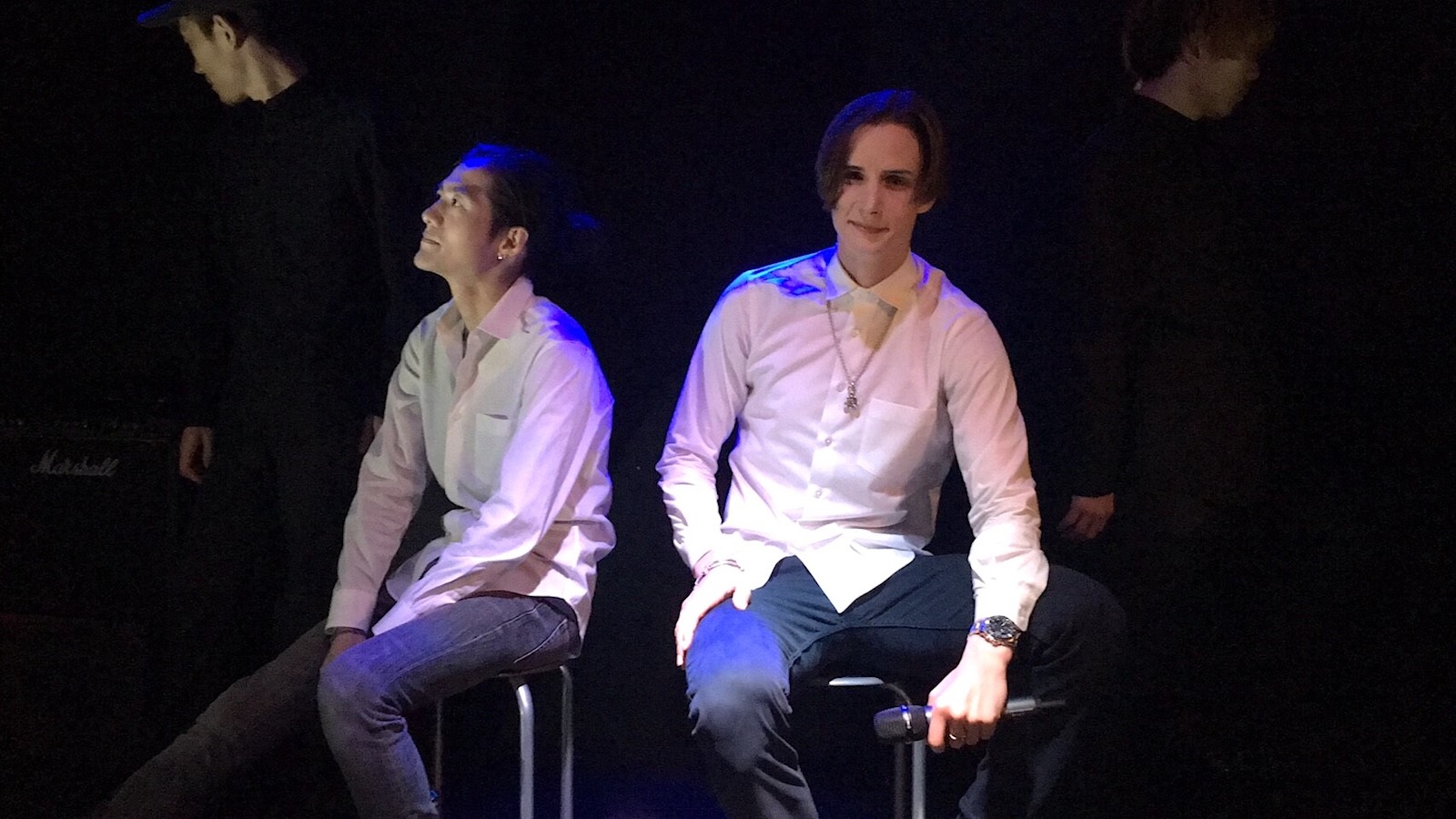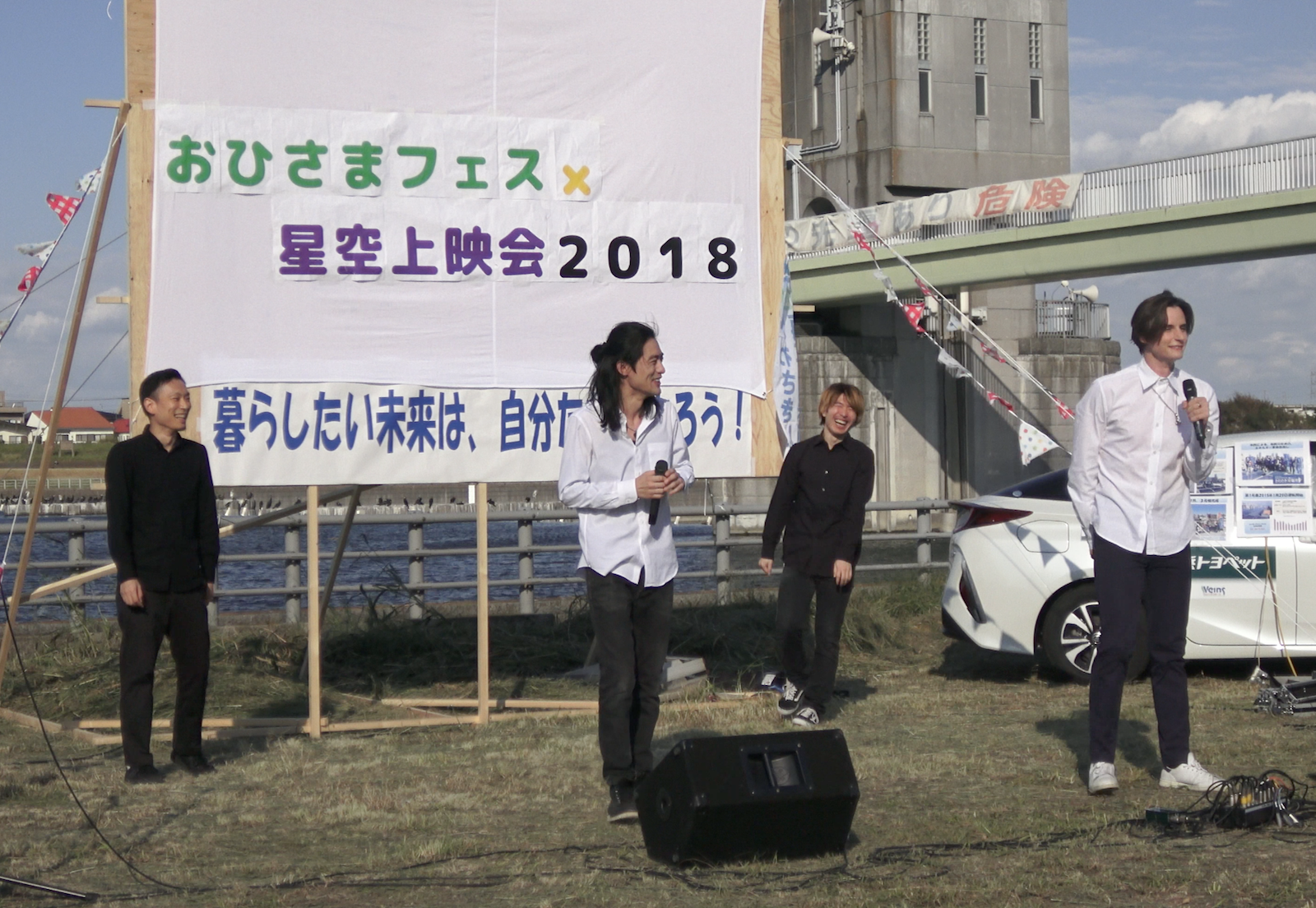James Collins is an American living in Japan with a dream. And that dream is managing one of Japan’s first all-foreigner J-Pop idol groups.
His vision of an international boy band in Japan, who dance and sing in Japanese, has been in the works for more than two years. The group, Colorfuuul, is made up of young-and-alluring foreigners, but their reaching the status of ultra-sensations like AKB48 or Arashi is a long way off.

It’s been a rocky start for Collins, a Virginia-native who moved to Japan in 2013 to pursue a master’s degree in journalism. The band, originally called Guyjin48 (“gaijin” -- actually pronounced "guy-jean" -- means foreigner in Japanese) had five members, an EP and was set to debut during this past summer with its new name “Colorfuuul.”
But three out of the five original members dropped out. The boys who are left are Roma from France, who collects stamps and does figure skating, and Jay from South Korea, who plays guitar and loves anime.
Facing an industry dominated by ironclad entertainment groups like “Johnnys,” Collins insists the band is not about cash but about culture. Still, Colorfuuul represents what boy bands are about. You know, the jutting cheekbones, matching outfits and that debonair “girl-I-know-what-you-need” look in their eyes — but with an altruistic approach by Collins to unite culture, music and bend Japan’s stiff us-vs.-them social barriers.

Even with setbacks, Collins is moving forward and is currently auditioning for new members. Colorfuuul will continue at the moment as a two-person band and has had two concerts in the Tokyo area since last month.
Japan Today had a chance to catch up with Collins, who discussed the three u’s in the name, why he wanted to do this in the first place, and of course, the haters.
I am interested in how and why a journalism student at Waseda University decided to take a left turn and start a pop culture project? Why not do a project in journalism or politics?
I thought of creating an all-foreign idol group back in 2013 when I first moved to Japan, well before my journalistic aspirations at Waseda University. Sitting in my tiny apartment watching an AKB48 music video, I imagined an interesting variation with foreign vocalists who sang original songs in Japanese to a Japanese audience.
As a sociologist by training, I look for connections, similarities and synthesis. Moreover, journalism is about outreach and communication, so the connection between my studies and our project seems natural to me and far from a left turn. Also, I have to pick a topic to report on in Japanese for my last semester at Waseda. What topic could I understand better than something I have created with my own hands?
Why did you change the name from Guyjin48 to Colorfuuul?
Some people were strongly against me using any play on the word gaijin. My music producer also suggested that the name Guyjin would probably not be met with Japanese approval. Though I thought the name was clever and catchy, I decided it best to avoid the potentially negative connotation. The name Guyjin48 came to me in an epiphany one day five years ago and I became quite attached to it. Coming up with a new one took quite a while.
Why does Colorfuuul have three u’s?
The three U’s in Colorfuuul stand for Universal, United, and Unified. Colorful is obviously a widely used word, so we needed a way to distinguish ourselves. Inserting three U’s was the solution. Someone told me to make it 8 U’s. Three is enough.
What is the significance of the name Colorfuuul?
The name actually came from a Japanese graphic designer who accompanied us on a group photo-shoot. He thought the members had great personalities and the multinational aspect was very colorful, so he said we should make that our name. Each of our members speaks Japanese and embraces Japanese culture, but each was shaped by his unique native land. We represent a colorful blend of old and new.

In a previous interview, you said the band “could help people have a better understanding and acceptance of foreign cultures.” How do you think the band has done this so far?
That is a pretty difficult question at this point. We are just starting. With the (Tokyo) Summer Olympics approaching in 2020, and as it attracts a foreign influx to supplement its graying workforce, Japan is gradually creating an environment that is easier to navigate for both foreign residents and their Japanese neighbors. I just hope we can contribute to making that transition as smooth as possible by promoting mutual respect, while celebrating the culture and traditions of the country we have chosen for study, work, and life.
Why is it important to you for the group to have international representation?
I certainly could have made the group entirely one ethnicity or one nationality, but that would have defeated my purpose. I wanted to feature the variety of people living in Japan, showing that although we come from different backgrounds and cultures and were raised differently, we are all focused on being a part of Japanese society and communicating in Japanese.
How have fans responded to the band so far?
There has been quite a bit of good reaction from J-Pop fans overseas. Once we get our media break in Japan, I am sure we will have a mostly positive reception here as well. I must note that our diversity may attract criticism based on historical antagonism and cross-cultural misunderstandings. In today’s world of social media and unrestrained instant reactions, it’s only a matter of time. Still I hope that we can be a catalyst for conversation and change in the minds of those people who may harbor negative stereotypes.
What kind of negative feedback have you gotten about the band from other foreigners?
Most of the negative feedback has been from J-Pop fans living in the West who are used to things a certain way and the complaints are what you would expect: not enough diversity, not my style, not my sound. It’s unavoidable and sometimes people don’t even need a reason.
On top of that, some foreigners might see me in the image of an exploitive outsider, guilty of cultural appropriation for pure profit all the while remaining apart from Japanese culture. It might reflect badly on them as foreigners in their adoptive society if that were true. However, the truth is that I feel even more at home in Japan than I did back in Virginia and want to make my contribution.
Who writes the music, lyrics and produces the music?
Shinnosuke, the trackmaster from Soul’d Out* is our music producer. By remarkably good fortune, I met Michael Bodin of Last Call** while I was teaching English (he was also teaching) and described my idea. He found it interesting. We got back in touch when I committed to forming the group. Michael remembered our conversation and was able to arrange an introduction to Shinnosuke.
Is it difficult to strike a balance between appealing to a Japanese audience and have the members represent different cultures? How do you deal with that?
As a group we have a shared respect and passion for Japanese culture and language. I make sure we never forget that. We are not really trying to provide a crash course in multiculturalism. Each member of Colorfuuul represents the bridge between the world and Japan with his voice. It is the harmonious blending of those voices in Japanese that we want people to hear and feel. The impression of unified difference is what I want to convey.
Do you have any personal experience of the Japanese system or Japanese people not being accepting of foreigners?
I expect my experience is not uncommon. There are plenty of people who either avoid interaction completely or deal with me based on some general stereotype they have picked up. They are used to foreigners who come and go for their own selfish purposes without letting themselves be touched by Japan.
For example, when people look at me they don’t expect me to speak Japanese and are incredibly surprised when I do. Whenever I am introduced as an American by Japanese friends and associates they will always add that I am one of the smart ones (or good ones). Still I know I am on probation, expected eventually to do something wrong. There are a lot of reasons for Japanese people to think that way, but there are many reasons to think otherwise. Getting people to realize this is, of course, another reason for Colorfuuul.
What type of meaningful change in Japan do you hope to bring about with Colorfuuul?
I hope this can become a platform for a more positive conversation regarding the changes occurring in Japan. No one disagrees that Japanese culture must be preserved even as Japan invites the world in. Japan is one of the most unique and interesting cultures on the planet.
The prevailing argument has been that an influx of foreigners into Japan will somehow diminish Japanese culture and that it will inevitably be a bad thing. I don’t believe it. There will always be people who make the effort to learn the language and adopt the customs, who will respect and honor the virtues of Japanese culture. So, I guess I would really like this project to be seen as a kind of mini preservation society for Japanese culture, as well as a means to attract more like-minded people from overseas to visit and live in Japan.
*Soul’d Out was a Japanese hip-hop group that started in 1999.
**Last Call is international male duo with members Michael Bodin, a Filipino-American, and Steve Sato, who is Japanese-German.
Check out more about Colorfuuul on their website: www.colorfuuul.com.
© Japan Today Take our user survey and make your voice heard.
Take our user survey and make your voice heard.














15 Comments
Login to comment
funkseoul
That fella with south asian name really had something against Japan in his recent comments.
Jpop might not be popular or as good as Kpop now, but the overall entertainment industry of Japan (i.e. music, acting) is bigger & better than the one in Korea (more bands, diversity, better movie, different kind dorama).
And you don't even count in the Manga & Anime industry (arguably the biggest & most popular in the world).
Kami Nana
@Hiro Have you ever compared the sizes of a boy group's fandom to an equivalent girl group's fandom? If so...you wouldn't be asking...
Silvafan
Like most major industries in Japan, they made of a small Cabal of companies. They all illegally collude with one another, while trying to out do one another.
Rarely, do you see anyone in entertainment here start independent and blow up. If you don't go through proper channels to show respect to your untalented sempais and greedy oyagis, you will be black balled. The entertainment industry is highly regulated that is why you say the same types of singers, singing groups, comedians, and actors. It is even worse for foreigners. It is like their wrapped in plastic. They can never evolve as an artist. They have to be the same person, doing the same thing until people get tired of their foreignness.
Too be independent, you basically will need to handle all aspects of the business on your own to make a living. I actually think that it is better because you learn a lot, and your money is your money! However, it takes patience and motivation, and your willingness to continue to improve your skill.
Fouxdefa
Oh my the foreigners who say this have no clue about the idol industry. What do they imagine it to be about if not "pure profit"??
Their biggest hurdle probably won't be that they are foreign necessarily but the fact that they're not contracted with an idol/talent jimusho. The only Japanese stars who get around that into mainstream are ones that make youtube sensations like Pikotaro. But I have seen Roma on TV before so maybe he has some useful connections.
Samit Basu, there is an interesting vibe to idol fans where they like to cheer on imperfect/clumsy/childish characters as they ganbaru towards their dreams and "watch them grow" over the course of time. Some fans even talk about "raising" sodateru, their idol of choice. If you work or join an association in Japan that is the social dynamic at work, it seems to comfort people to watch cute idols go through the same thing. K-pop is popular here too but it has a different fan market than J-pop and I don't think they're in competition really.
Chop Chop
They are good. I wish them for the best luck.
Samit Basu
The J-Pop standard is much much lower than the K-Pop standard, that's why.
Since the market standard is expectations are lower, it's easier to launch something in Japan than in Korea.
People complain about manufactured idols in Korea, but at least they are extremely well-manufactured to the highest standard, unlike J-Pop idols.
Luddite
This is like something from The Day Today. Someone should tell him the 80's are over.
Silvafan
Ques: Why did an American start an all foreign idol group?
ans: Money! Duh!
Sid
Vince Black
I actually auditioned for this group. Although he said he liked my tight trousers, I was rejected for being too fat. Or too faaat should I say.
Wakarimasen
But three out of the five original members dropped out. The boys who are left are Roma from France, who collects stamps and does figure skating, and Jay from South Korea, who plays guitar and loves anime.
Hmmmm..... Not likely to capture the imagination of the9ir target teenybopper market.
also does Japan really need another rubbish "idol" group??
Vince Black
I'd totally audition for this. It seems a viable career option
Hiro
'all-foreigner idol'. Why only guys?
They should have try it with girls if they wanted to compare with AKB48. Not easy to get a large fan base if they only stick with males foreigners.
1glenn
I would be interested in a follow-up article somewhere down the road.
socrateos
We had these before you guys and had some success:
https://www.youtube.com/watch?v=BMkJjevfaiY
https://www.youtube.com/watch?v=8e7j7m6CidQ
Good luck to you.
Madden
Good luck to the guy but I'd imagine the biggest issue he will have will be with visas for potential members.